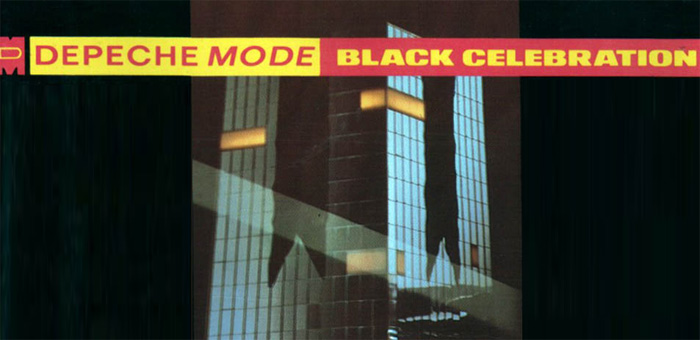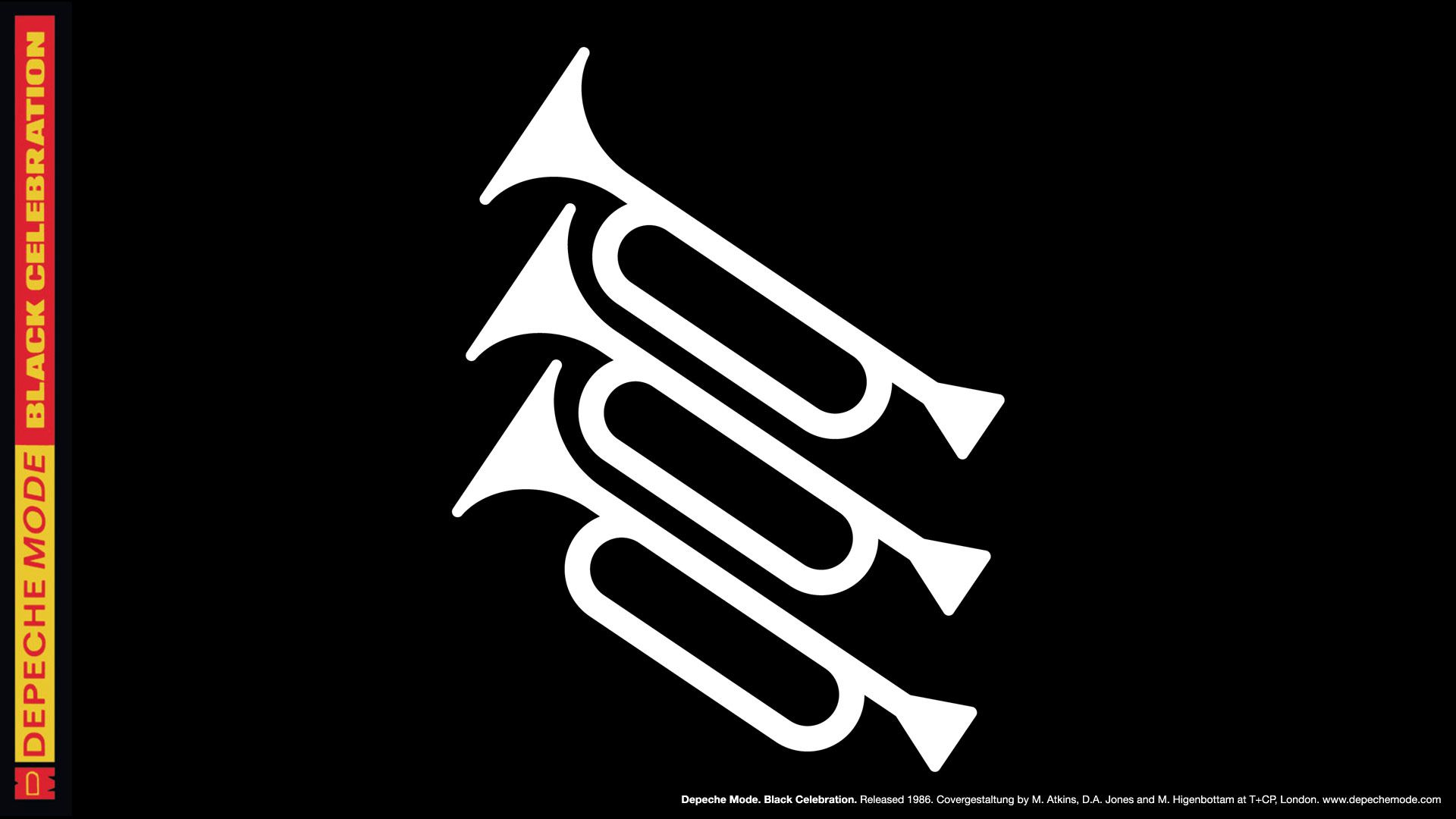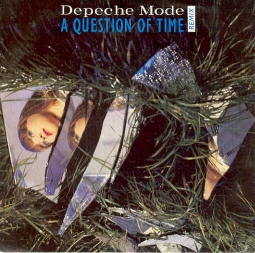Another guest post and another wonderful read. Today's blog is by Kevin May, a UK based journalist who usually writes about the travel industry and technology. Kevin is, as you'd expect given his appearance here, a bit of a Depeche fan and has been a Devotee since buying Get The Balance Right. The key thing you need to know about Kevin is that he is the author of the the forthcoming Depeche Mode book Halo which examines the story behind Violator. It is a book that you will not want to miss, trust me. Kevin has very kindly told me a bit about the content of the book and, if you knew what I know, you'd be beyond excited. I was delighted when Kevin agreed to write a piece for this month's project and, unsurprisingly, it's a wonderful blog. Luckily for me, he's included a few snippets from interviews he did with the likes of Gareth Jones for Halo. You're in for a treat
I should also mention a joint project that Kevin and I are about to embark upon. In the next couple of months, we'll be releasing a podcast called Violation Celebration which, as you might already have guessed, will be about Violator and Black Celebration. More to come on that soon. Anyway, enough from me - read on.
BLACK CELEBRATION - THE PERFECT DRESS REHEARSAL FOR VIOLATOR
Depeche Mode fans are genetically hard-wired to love a heart-felt debate about their favourite band.
In fact, some would argue that - perhaps ranking alongside actually listening to the music or seeing them at gigs - having the opportunity AND need to regularly discuss all things Depeche is actually one of the vital bits of glue that binds the band's fiercely loyal fans together.
Best B-side? That would be My Joy (leave a comment below). Favourite post-Alan Wilder album? Probably Ultra. Least likeable video? Quite a few, but It's Called A Heart. Most memorable concert? Paris Bercy, 1993.
Assuming you've got this far into the article, I am guessing that many of you are already formulating your own answers... We all, let's face it, have a point of view when it comes to Depeche.
My second favourite album by Depeche Mode is Black Celebration. That obviously goes against the grain of what David McElroy's excellent, month-long series is all about - but it's a now-unshakable opinion.
Black Celebration may have found itself one rung higher up my ladder of favourites if it wasn't for the masterpiece that came along four years later in the shape of Violator.
Whilst that point-of-view is certainly up for debate (and, yes, it has been a central and regular argument in my world over the past 18 months), very few fans could argue that both Black Celebration and Violator do not deserve the accolade of being the two most important albums in the career of the band.
Neil Ferris, Depeche Mode's radio and TV plugger throughout the 1980s, is right when he says that Violator eventually became the "seminal" album for the band.
He says this in the context of how important Construction Time Again was in the making of the Depeche sound, and the reception it subsequently received from fans and critics.
But any seminal-like status heading the way of Construction Time Again was later overtaken when Violator was released in 1990.
But why?
Analyse a little further, add some other pivotal moments into the mix, and you start to see a pattern: the debut album Speak & Spell, 1983's Construction Time Again, Black Celebration in 1986, Violator, Ultra in 1997 and Playing The Angel in 2005.
Every two "eras", Depeche create something new... something that changes how they work, or how they are perceived and received, all with lasting consequences.
This simple calculation makes sense: Speak & Spell put the band on the map; Construction Time Again saw the emergence of the "Depeche sound" (not least with the studio and musical influences of Gareth Jones and Alan Wilder respectively); Ultra showed that band could reconvene successfully despite their well-documented personal issues; and Playing The Angel set the modern strategy in place (production-promotion-tour time-line, structure and style) which pretty much continues to this day.
But it is arguably the two long-players in the middle of that aforementioned collection of pivotal moments, Black Celebration and Violator, that have the most cause to be celebrated (no pun intended).
If Black Celebration gave rise to a certain depth and sonic to Depeche's music, Violator brought that same intensity alongside a pop accessibility to the masses (again, no pun intended).
If Black Celebration allowed the band to start to create a certain style and culture around their image (later mirrored by legions of their fans), Violator gave artistic collaborator Anton Corbijn the opportunity - with the band's universal blessing - to finally unleash his creativity across the album, videos, photography and merchandise.
If Black Celebration illustrated that there was a world for Depeche beyond their European heartland, as until-then relatively unknown audiences in the US suddenly flocked to see them on the album's tour, 1990's World Violation Tour saw the band accelerate their status as genuine stadium and arena act to extraordinary heights, at a global scale.
Breathing in fumes (of motivation)
It is perhaps easy to reflect on two landmark periods in the history of Depeche Mode through rose-tinted spectacles.
Do we, as fans, end up placing these eras on musical pedestals because we now have the benefit of 30 years to reflect on Black Celebration and 25 years for Violator?
The answer is a bit of no, and a fair amount of yes.
I've lost count of the number of times that fans have told me that they can remember where they were when they first heard Personal Jesus or A Question of Time.
Or how they felt when seeing the band on the tours that accompanied albums (a thunderous Halo during the World Violation Tour remains reasonably indescribable for me, 25 years on).
These are all influential and valid moments, for us as fans.
But it would be optimistic to suggest that fans and critics genuinely realised the career-defining qualities of either Black Celebration or Violator in the immediate aftermath of their respective releases.
They were obviously both special albums at the outset, but for reasons that were more to do with the quality of Martin Gore's songs and how each album made people feel.
But we can now see how Black Celebration and Violator - a quarter of a century later - are intertwined in a unique and hugely important way.
The experience of creating Black Celebration in late-1985 and early-1986, paved the way for how the band would consider working in the studio by the time they got to Milan in the spring of 1989.
Producers Daniel Miller and Gareth Jones had pushed the band during the recording of Black Celebration, using the so-called "live the album" idea.
The result was an intense experience that caused obvious tensions in the studio, but helped shape the mood of the album.
It was this concept, of testing themselves as creative artists, which ignited something exciting within the team that later saw them appoint Flood (Mark Ellis), a figure that most within the camp considered the best person at the time to really take Depeche to a new level.
Flood was considered much more of a collaborator than a producer by the time that Depeche Mode had got to the recording sessions for Violator - someone who knew which buttons to push (both literally and figuratively) in the studio to get the very best out the songs and the production.
But that having someone alongside them to not only help but challenge their preconceived ideas of "how it should be done" was born during Black Celebration.
 |
| Gareth Jones and Kevin in Gareth's studio 2015 - picture (c) Kevin May |
A lot of the credit for this should go to Gareth Jones, the co-producer of Black Celebration who had started work with the band as a engineer on Construction Time Again and whose open-minded style and approach (especially to emerging concepts back in 1983 as sampling) unlocked their confidence - not least Alan Wilder's musical prowess - to try new things.
Jones knew that in the right atmosphere, despite the tensions that ensued during the recording, he and Miller could inspire the band to dig deeper into their creative arsenal to produce a series of songs that were unsurpassed in their depth and intensity at that point.
Experimentation and "getting out of your own way" (a phrase that was mentioned fairly frequently in the interviews for HALO) always seems to trigger the best from Depeche Mode.
Interestingly, talking to me in 2015, I learned that Jones was disappointed to have been "abandoned" after Black Celebration when he learned he would not be asked to work with the band again for the follow-up album, Music For The Masses.
In some respects it is easy to sympathise with Jones, having completed a "trilogy" with Depeche (including Some Great Reward in 1984), but those who have met him or listened to and read his interviews realise that there is now, with age, an enormous respect he has for the band and how they engineered their way through the late-1980s.
As a younger man, he says, "I was a bit prejudiced about Music For The Masses and didn’t realise it to be the good album that it was, perhaps".
"But anyway, by the time Violator came along, enough water had passed under the bridge that I was able to embrace it and listen to it, and enjoy it.
Visually saved us
Of zero influence to the sonic contained on Black Celebration, but of equal importance to the style that emerged during Black Celebration, was the arrival of Anton Corbijn.
Plenty has been noted on previous occasions about the Dutchman's role in the history of Depeche Mode - a relationship that has now spanned three decades, yet began with an unpretentious, unusual (for a synth band) and fun video for A Question Of Time.
But given the creative partnership (as arty-types would call it) they now have, it's easy to forget - or difficult to comprehend - that the collaboration started off in as low-key a way as possible.
Richard Bell, Corbijn's official producer on the Depeche videos from Stangelove until the turn of the century, told me last year that as young system producer at product company Vivid, he was unable to travel to Los Angeles to help with A Question Of Time.
The band was on tour at the time, budgets were tight, so Corbijn handled much of the video's on-site work himself, with a few helpers for the equipment.
Bell did all the setting up of the video's production remotely, from a facility in London, whilst the band (not least Alan Wilder, who did an extra day's filming) worked with Corbijn at various locations in California.
Fast forward a few years and the Corbijn team was "all in" with Depeche Mode.
After the trademark, grainy, black and white style that was used on most of the Music For The Masses videos, Corbijn was given full reign to create some of Depeche's most iconic visual work, such as Enjoy The Silence.
It is reasonably safe to say that if Corbijn had not gained the confidence of the band during the creation of that simple video for A Question Of Time, during that scorching summer of 1986 in the US, Depeche's history may have taken an entirely different path.
Poor ol' Music For the Masses
It is worth noting briefly the album in the middle of Black Celebration and Violator, 1987's Music For The Masses, which has its own special place in the story of Depeche Mode, but for wholly different reasons.
It doesn't sound or feel as "seminal" as Violator, nor is it anywhere near pioneering as its predecessor.
Lest we forget, Music For The Masses is a great album (as we all know, spawning Never Let Me Down Again, Strangelove, Behind The Wheel and - for me - the hugely underrated Nothing), but it doesn't quite create the same frisson amongst fans that Black Celebration and Violator somehow manage to do.
In fact, strangely, and with the benefit of hindsight again, Music For The Masses now feels like a stepping stone between those two albums.
Yes, it has some classic Depeche Mode songs; yes, it inspired a pivotal moment in the shape of the Pasadena Rose Bowl gig in 1988; and , yes, it stands proudly alongside Songs Of Faith And Devotion as an important and great album.
But it doesn't have the same place in the history of the band as Black Celebration or Violator.
If the former and latter didn't exist, Music For The Masses would perhaps be up there as the iconic album from the band.
But Black Celebration's depth, tone and overall feel was only matched (improved on, some argue) with Violator.
Yet what we should all recognise now, and appreciate, is that without Black Celebration setting a standard for process and focus, some of it subconsciously, some of it due to the decisions that were made as a band about things other than their visual output, Violator may never have become the seminal moment in the band's career that it did.
I'll happily "drink to that".
Told you you'd enjoy that!.
Thanks very much Kevin.

























